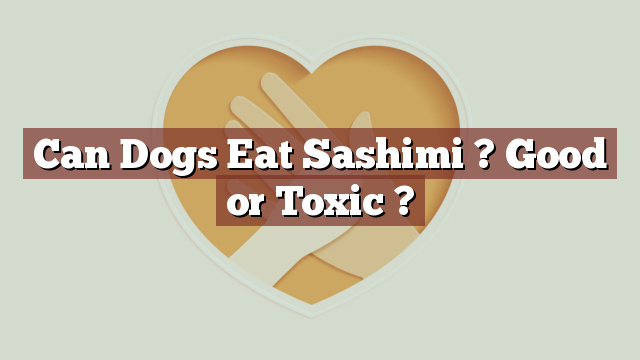Can Dogs Eat Sashimi? Good or Toxic?
When it comes to our beloved furry friends, it is important to know what foods are safe for them to consume. Dogs have different dietary requirements compared to humans, and certain foods that are considered safe for us may actually be toxic to dogs. One such food that raises questions is sashimi, a popular Japanese delicacy. In this article, we will explore the safety and potential risks of dogs consuming sashimi.
Nutritional Value of Sashimi: What Does it Offer to Dogs?
Sashimi is a type of dish that consists of thinly sliced raw fish or seafood, often served with soy sauce and wasabi. From a nutritional standpoint, sashimi is rich in protein, omega-3 fatty acids, and various vitamins and minerals. These nutrients are essential for a balanced diet and can provide numerous health benefits to humans. However, it is important to understand that dogs have different nutritional needs, and their digestive systems may not be able to handle certain foods in the same way.
Can Dogs Eat Sashimi? Determining Its Safety for Your Pet
Can dogs eat sashimi? The answer is no. While sashimi may seem like a delicious treat, it is generally not safe for dogs to consume. Raw fish and seafood can harbor harmful bacteria, parasites, or toxins that can cause serious health issues in dogs. Moreover, some types of fish used in sashimi, such as tuna, can contain high levels of mercury, which can be toxic to dogs if ingested in large amounts. Therefore, it is best to avoid feeding sashimi to your canine companion.
It is important to note that the safety of feeding raw fish to dogs is a topic of debate among experts. Some argue that dogs are natural carnivores and can handle raw meat, while others believe that the risks outweigh the potential benefits. As a responsible pet owner, it is advisable to err on the side of caution and prioritize your dog’s well-being.
Potential Risks or Benefits of Dogs Consuming Sashimi
Feeding sashimi to dogs can pose several risks. Raw fish can contain bacteria such as Salmonella or Listeria, which can cause food poisoning in dogs. Additionally, parasites like tapeworms or roundworms can be present in raw fish, leading to gastrointestinal issues or even more severe health complications. The high mercury content in certain types of fish used in sashimi can also be detrimental to a dog’s health if consumed regularly.
On the other hand, some argue that small amounts of properly sourced and prepared raw fish can provide certain health benefits to dogs. Raw fish is a good source of omega-3 fatty acids, which can promote a healthy coat, reduce inflammation, and support brain function. However, these benefits can be obtained through safer alternatives such as cooked fish or fish oil supplements, which eliminate the risk of bacterial or parasitic infections.
My Dog Ate Sashimi! Steps to Take When Your Pet Eats It
If your dog accidentally consumes sashimi, it is important to take prompt action. First, assess the situation and determine the quantity and type of fish ingested. Contact your veterinarian immediately for guidance, especially if symptoms such as vomiting, diarrhea, or lethargy occur. It is crucial not to induce vomiting without professional advice, as it may not be suitable for all situations.
Conclusion: Weighing the Pros and Cons of Dogs Eating Sashimi
In conclusion, it is not recommended to feed sashimi to dogs due to the potential risks associated with raw fish and seafood. While sashimi offers certain nutritional benefits to humans, the same cannot be said for dogs. The risks of bacterial infections, parasitic infestations, and mercury toxicity outweigh any potential advantages. As responsible pet owners, it is crucial to prioritize our furry friends’ health and well-being by providing them with a balanced and safe diet. If you have any concerns about your dog’s diet or health, consult a veterinarian for professional advice.
Thank you for investing your time in exploring [page_title] on Can-Eat.org. Our goal is to provide readers like you with thorough and reliable information about various dietary topics. Each article, including [page_title], stems from diligent research and a passion for understanding the nuances of our food choices. We believe that knowledge is a vital step towards making informed and healthy decisions. However, while "[page_title]" sheds light on its specific topic, it's crucial to remember that everyone's body reacts differently to foods and dietary changes. What might be beneficial for one person could have different effects on another. Before you consider integrating suggestions or insights from "[page_title]" into your diet, it's always wise to consult with a nutritionist or healthcare professional. Their specialized knowledge ensures that you're making choices best suited to your individual health needs. As you navigate [page_title], be mindful of potential allergies, intolerances, or unique dietary requirements you may have. No singular article can capture the vast diversity of human health, and individualized guidance is invaluable. The content provided in [page_title] serves as a general guide. It is not, by any means, a substitute for personalized medical or nutritional advice. Your health should always be the top priority, and professional guidance is the best path forward. In your journey towards a balanced and nutritious lifestyle, we hope that [page_title] serves as a helpful stepping stone. Remember, informed decisions lead to healthier outcomes. Thank you for trusting Can-Eat.org. Continue exploring, learning, and prioritizing your health. Cheers to a well-informed and healthier future!

